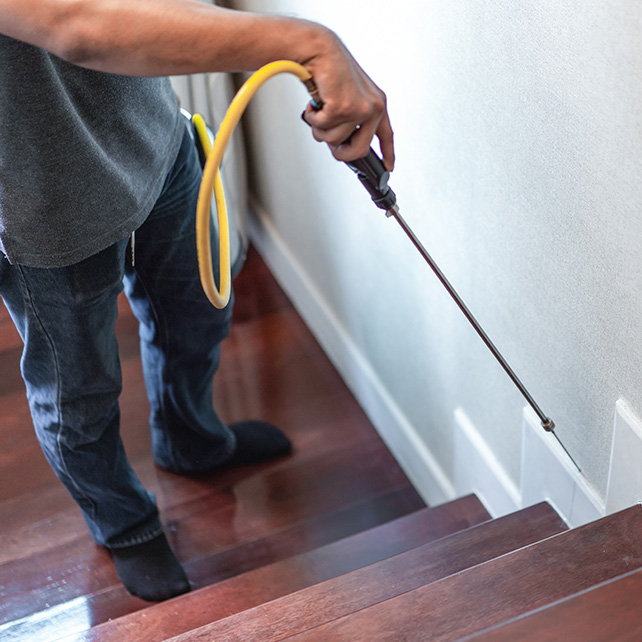
Rodent Control & Exclusion in Boise, ID
Rats & Mice Are Putting Your Family in Danger
Rodents such as rats and mice continue to invade Boise in large numbers. These pests cause property damage, physical injury, and spread life-threatening diseases, so you should never allow them to multiply in or around your property.
With nearly two decades of experience and counting, the team behind Sawtooth Pest Control has provided outstanding rodent control services to home and business owners throughout Boise. By combining professional treatments with Integrated Pest Management programs, we offer everything you need to restore safety and comfort to your home.
Rodent infestations risk structural damage and also pose a serious health risk. Diseases such as Hantavirus, leptospirosis, and salmonella are commonly associated with these pests. Rodents also cause destructive behavior, chewing through electrical wires, insulation, and even creating potential fire hazards.
Many Boise neighborhoods, especially those near river corridors and greenbelts, experience increased rodent pressure due to ready access to food and shelter. Properties in the North End, West Boise, and along the Boise River often face a higher risk of infestation as rodents migrate indoors in search of warmth during colder months. Our services adapt to these seasonal trends by implementing preventive measures at the most effective times of the year, maximizing protection when you need it most.
Book your first complimentary visit by calling (208) 540-9689 or sending us a message online today.
How Sawtooth Pest Control Provides Effective Rodent Treatments
All rodent exclusion services from Sawtooth Pest Control follow three straightforward steps.
Below is an outline of our entire treatment process from start to finish:
- Our inspection services investigate your home for signs and symptoms of rodent activity. We look for holes, gnaw marks, droppings, trails, and nests that may have formed around the property.
- We use a combination of exterior bait stations and traps to remove heavily infested pests. Our technicians also perform exclusion work on softball-sized holes and smaller, using treatments suitable for your family and environment.
- As a family-owned and women-led local business, Sawtooth Pest Control offers a full rodent-free guarantee on every home treatment.
We focus on identifying the root causes of infestations, such as landscape features, gaps around utility openings, and nearby structures that provide rodents with access. In Boise, architectural details in older neighborhoods, like the North End, often provide hidden entry points for mice and rats. We apply proven strategies that target these vulnerabilities, reducing the likelihood of recurring rodent issues and helping residents protect their properties.
Why Boise Residents Choose Sawtooth Pest Control
Boise's unique climate and geography make it an ideal habitat for various rodent species, including Norway rats, roof rats, and house mice. The river systems and the semi-arid climate create perfect breeding environments for these pests. Sawtooth Pest Control understands the local challenges and adapts services to meet the needs of Boise residents.
Our deep understanding of Boise’s local ecosystems allows us to implement strategies that are both effective and environmentally friendly. By utilizing innovative techniques and sustainable practices, we deliver long-lasting results. Our goal is to eliminate your current rodent problems and prevent future infestations with customized rodent control in Boise.
Homeowners choose Sawtooth Pest Control because we tailor our solutions to the specific conditions of each Boise neighborhood. The combination of urban infrastructure, nearby foothills, and the Boise River produces distinct patterns of rodent migration. Our team keeps up with local rodent trends, city ordinances regarding pest control, and exclusion methods recommended by Ada County. This local knowledge leads to safer and more effective results for homes and multi-unit buildings throughout the Treasure Valley.

Why Choose Sawtooth Pest Control?
Let Us Solve Your Pest Problems
-
Quick Response TimesWe offer same-day and emergency services.
-
Experienced ProfessionalsWe have two decades of combined experience solving pest problems.
-
Insured for Your Peace of MindEntrust your pest control needs to licensed, insured professionals.
-
100% Satisfaction GuaranteeWe never leave you unhappy! We guarantee it.
Defend Your Home from Rodents with These Prevention Tips
Rodent exclusion services are an excellent first step toward rat and mouse control, but ongoing protection with these tips and tricks will strengthen your barrier even more.
- Eliminate access to food or water inside your house.
- Prune shrubs, trim tree branches, and mow tall grass to remove exterior hiding places.
- Remove garbage from your home at least once weekly, and always wash dirty dishes immediately.
Sealing cracks and holes around your property is essential to block rodent entry. Make sure window screens remain intact and that door weather stripping stays in good condition. Regularly inspect your home’s exterior for signs of rodent activity, such as burrows or tunnels. By taking these preventative measures, you can significantly reduce the likelihood of an infestation.
In addition to mechanical repairs, store pet food and birdseed in tightly sealed containers to avoid attracting rodents throughout Boise neighborhoods. Check outbuildings, garages, and sheds regularly; these areas often serve as first entry points for rodents before they come inside your home. Maintain compost properly and clear leaves promptly in yards to reduce food and shelter sources that increase rodent activity, especially in autumn and winter.
Understanding Boise’s Rodent Population Dynamics
Boise's rodent population consists mainly of Norway rats, roof rats, and house mice. Each species shows unique behaviors and chooses different habitats. For instance, Norway rats dig at ground level and often inhabit places near shelter and food sources. Roof rats are excellent climbers, usually found in higher areas of buildings, such as attics and trees.
House mice adapt easily to both urban and rural settings. They frequently nest indoors, making them the most common household invaders. Knowing how each rodent species lives and moves helps Sawtooth Pest Control create a targeted rodent control plan in Boise that addresses the unique challenges of each species.
Changes in Boise’s seasonal weather, such as early snowfall or a longer warm season, often trigger increases in rodent activity as pests look for steady shelter and reliable food. Some years, especially those with dry summers, cause large numbers of rodents to travel from fields and riverbanks into neighborhoods. By tracking these patterns, Sawtooth Pest Control anticipates areas with higher risk and adapts preventive strategies for local buildings and property types.
Frequently Asked Questions About Rodent Control



Happy Customers in Your Neighborhood
Hear From Our Happy Customers
-
“The job they did got rid of my gopher problem--which was significant and arose quickly.”- Lynda R.
-
“Got an appointment for the next day.”- Ryan McGuinness
-
“They also are very knowledgeable and great prices.”- Linda F.
Recent Blog Articles
Want all the latest news or updates? Browse through our blog to read our most recent posts and featured articles.


